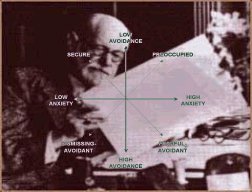Attachment,
Cognition, and Personality Laboratory
University of Illinois at Chicago
Research
Projects
home
| people | research
| publications | space
| resources & links
Our research is broadly focused on attachment dynamics, affect regulation,
and personality processes. A complete list of our past research is posted
on our publications page. Here are some of the projects that are currently
underway.

Attachment and the Defensive Regulation of Memory and Attention
In this research we are following up a study by Fraley, Garner, and Shaver (2000) which found that highly avoidant adults (i.e., adults who are uncomfortable depending on others in close relationships) have more difficulty remembering emotional information. We are currently attempting to determine whether these findings hold for both implicit and explicit tests of memory, and whether the findings are best explained by the effect of defensive processes in encoding or retrieval.

We are currently conducting a number of studies on the sexual double standard--the idea that males are socially rewarded for sexual activity whereas females are derogated for sexual activity. Our goal is to understand why the double standard seems so prevalent in contemporary society. To do this, we are researching several factors that may influence the double standard, including group dynamics, confirmation bias, and social norms.

Attachment and Transference Processes
According to attachment theory, the mental representations that we hold regarding significant others from our past should play a role in shaping the way we relate to new relational partners. In this research we are adopting Susan Andersen's paradigm for studying the transference of significant other representations in order to clarify some of the processes that may promote the stability of attachment patterns from one relationship to the next.

The Evolution of Monogamy: A Comparative and Phylogentic Analysis of Social Relationships
In this project we are studying the association among ecological, phyologentic, and social variables in a sample of 200 mammalian species in an attempt to gain a better understanding of how social relationships--specifically, monogamous relationships--may have evolved.